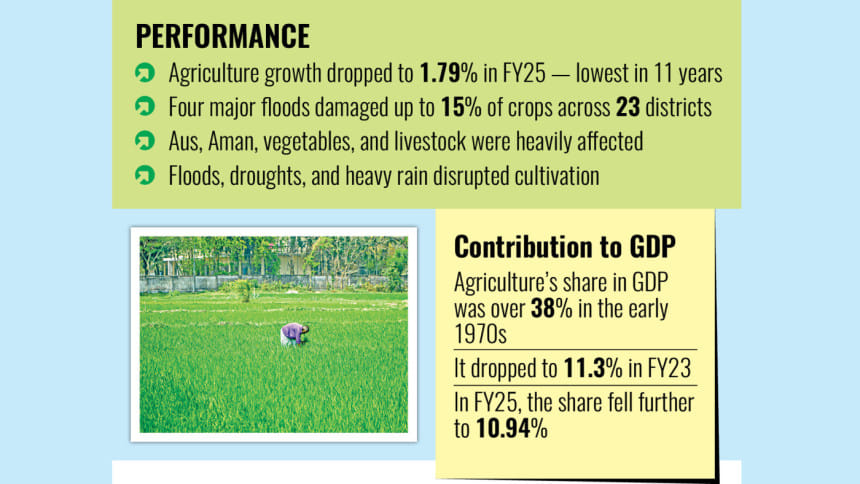Agriculture growth hits decade-low

Bangladesh's agriculture sector recorded its weakest growth in over a decade this fiscal year, prompting fresh concerns about food security, rural incomes and overall economic recovery.
The growth rate stood at 1.79 percent in fiscal year (FY) 2024–25, matching the lowest level recorded in the last 11 years, according to the Bangladesh Bureau of Statistics (BBS).
The same rate was last seen in FY 2015–16. In previous FY 2014-15, the sector grew by 2.45 percent.
For the latest dip in the farming sector growth, agri economists and industry insiders point to a mix of unfavourable conditions, such as prolonged flooding, unseasonal rain and political unrest.
Agriculture's share of the country's gross domestic product (GDP) has also continued to shrink.
While it accounted for over 38 percent in the early 1970s, its contribution dropped to 11.3 percent in fiscal year 2022–23 and further dropped to 10.94 percent in FY25, according to BBS.
This growth rate is the lowest in recent years, and one of the main reasons behind it is flooding, followed by drought and heavy rains, which have significantly disrupted cultivation, said Jahangir Alam Khan, an agriculture economist.
As a result, the production of Aus and Aman season paddy and vegetables has been severely affected, along with the livestock and poultry sectors. So, a decline in growth was expected, he said.
In the fiscal year 2009–10, agricultural growth in the country was 7 percent -- an all-time high, he added.
After that, growth remained around 4 to 5 percent, but it had never dropped as low as in the current fiscal year, added Khan, also a former president of the Bangladesh Agricultural Economists Association.
Because of this, imports have had to be increased. Until April of the current fiscal year, around 600,000 tonnes of rice had to be imported. Wheat imports have crossed 40 lakh tonnes, he said.
Khan also said prices of many essential food items in the market have gone up, reflecting a decline in domestic production.
From June 19 to June 23 last year, floods affected seven districts in the Sylhet and Rangpur divisions that damaged 14 percent of crops, including Aus and Aman seedlings and vegetables, according to the Department of Agricultural Extension (DAE).
Just seven days later, another flood hit 14 districts in the north, northeast, and southeastern parts of the country, damaging 13 percent of all crops.
In August, another bout of floods and heavy rains affected 23 districts in the northeast, south, southwest, and southeast regions and damaged 15 percent of all crops.
Then, heavy rains on September 12–19 affected 16 districts and damaged around one percent of all crops.
The two floods in the Chattogram, Sylhet, and Mymensingh divisions damaged an estimated yield of about 10 lakh tonnes of Aman season paddy plants just before flowering, according to the DAE.
According to an assessment by the Centre for Policy Dialogue, the damage caused by the eastern flood amounted to at least Tk 14,421.46 crore.
The agriculture and forestry sectors suffered the highest damage, amounting to Tk 5,169.71 crore.
Mohammad Jahangir Alam, a professor of the Department of Agribusiness and Marketing at Bangladesh Agricultural University (BAU), echoed Khan.
Investment in the poultry and livestock sectors in the current fiscal year has been much lower than expected, which is one of the reasons behind the slowdown in growth, he said.
He said Bangladesh has been going through political turmoil since June last year, which had an impact on all sectors as it led to low investments.
The share of credit disbursement to the livestock and poultry subsectors of the agriculture industry slipped slightly in the first eight months of the current fiscal year (FY), according to a report by Bangladesh Bank.
The report also said scheduled banks in the country disbursed a total of Tk 22,125 crore for agriculture in the July–February period of FY25, reflecting a decrease of 6.60 percent year-on-year.

 For all latest news, follow The Daily Star's Google News channel.
For all latest news, follow The Daily Star's Google News channel. 



Comments